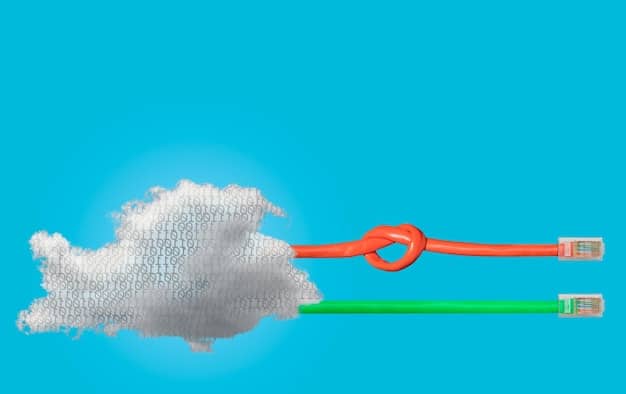Net Neutrality 2025: How FCC Rules Impact Streaming Costs

The FCC’s new net neutrality rules could significantly impact streaming costs in 2025 by potentially allowing internet service providers to charge more for accessing specific content, affecting consumers’ monthly bills.
Navigating the digital landscape often means keeping an eye on regulations that can impact our online experiences and, more importantly, our wallets. With the introduction of new FCC net neutrality rules on the horizon, it’s crucial to understand how will the new FCC net neutrality rules impact your streaming costs in 2025?
Understanding Net Neutrality and Its Importance
Net neutrality is the principle that all internet traffic should be treated equally, ensuring that internet service providers (ISPs) don’t discriminate against or favor any particular content, applications, or websites. This concept has been a cornerstone of a free and open internet, fostering innovation and competition.
However, the FCC’s stance on net neutrality has shifted over the years, leading to debates about the role of government regulation in the digital age. Understanding the core principles of net neutrality is essential to grasp how changes in these regulations can affect your streaming costs.
The Core Principles of Net Neutrality
At its heart, net neutrality advocates for a level playing field, where ISPs cannot block, slow down, or prioritize any content. This means that your access to Netflix should be just as fast and reliable as your access to a smaller, less established streaming service.
These principles aim to prevent ISPs from becoming gatekeepers of the internet, ensuring that consumers have access to a diverse range of content without interference. Without net neutrality, ISPs could potentially:
- Charge different rates for access to different streaming services.
- Throttle bandwidth for specific content, making it slower to load.
- Block services that compete with their own offerings.
The implications of these actions are significant, potentially leading to higher costs for consumers and stifling innovation in the streaming industry.
In summary, net neutrality ensures a fair and open internet, preventing ISPs from controlling what you see and how much you pay for it.
The FCC’s New Net Neutrality Rules: A Breakdown
The FCC’s new net neutrality rules represent a significant shift in how the internet is regulated in the United States. These rules, slated to take effect in 2025, aim to reinstate net neutrality protections that were previously rolled back. Here’s a detailed breakdown of what these rules entail.
The primary goal of the new regulations is to prevent ISPs from engaging in practices that could harm consumers and stifle competition in the streaming industry.

Key Provisions of the New Rules
The FCC’s new net neutrality rules include several key provisions designed to protect consumers and promote a fair internet ecosystem. These provisions cover various aspects of ISP behavior, including:
- Blocking: ISPs are prohibited from blocking access to legal content, applications, services, or non-harmful devices.
- Throttling: ISPs cannot intentionally slow down or degrade access to specific content or services.
- Paid Prioritization: ISPs are barred from creating “fast lanes” for certain content in exchange for payment, ensuring that all traffic is treated equally.
These provisions are intended to ensure that ISPs cannot unfairly discriminate against specific streaming services or prioritize their own content. This is a crucial step in maintaining a level playing field for all online content providers.
In essence, the FCC’s new rules aim to restore the principles of net neutrality, ensuring that all internet traffic is treated equally and consumers retain access to a diverse range of content without interference.
How These Rules Could Impact Your Streaming Costs
The implementation of the FCC’s new net neutrality rules could have a multifaceted impact on your streaming costs. While the primary intention is to protect consumers, the actual effects on your monthly bills could vary depending on how ISPs respond to the new regulations.
Understanding the potential scenarios is essential to prepare for any changes in your streaming expenses.
Potential Scenarios for Streaming Costs
With the new rules in place, several potential scenarios could unfold, affecting how much you pay for streaming services:
- Increased Competition: Net neutrality could foster more competition among streaming services, potentially leading to lower prices as companies vie for subscribers.
- Stable Pricing: By preventing ISPs from charging streaming services for prioritized access, the rules could help maintain stable pricing, preventing sudden cost increases.
- Investment in Infrastructure: ISPs might argue that net neutrality limits their ability to invest in infrastructure upgrades. This could lead to slower internet speeds over time, indirectly affecting the quality of your streaming experience.
These scenarios highlight the delicate balance between regulation and market dynamics. While the goal is to protect consumers, the actual outcomes could depend on how ISPs adapt to the new rules and how the streaming industry evolves.
Ultimately, the impact of the new net neutrality rules on your streaming costs will depend on a complex interplay of market forces and regulatory enforcement.
Arguments For and Against Net Neutrality
The debate over net neutrality is multifaceted, with strong arguments both for and against government regulation of the internet. Understanding these arguments is crucial to forming an informed opinion about the FCC’s new rules and their potential impact.
Advocates and opponents of net neutrality present compelling cases that warrant careful consideration.
The Case for Net Neutrality
Proponents of net neutrality argue that it is essential for preserving a free and open internet. Their arguments often center on:
- Innovation: Net neutrality ensures that small startups and innovative services can compete with established players without being disadvantaged by ISPs.
- Consumer Protection: It prevents ISPs from exploiting their market power to charge consumers more for accessing specific content or services.
- Free Speech: Net neutrality safeguards the ability of individuals to access and share information freely online, without censorship or discrimination.
These arguments highlight the importance of net neutrality in fostering a democratic and competitive online environment. By preventing ISPs from acting as gatekeepers, it ensures that the internet remains a platform for innovation and free expression.

The Case Against Net Neutrality
Opponents of net neutrality argue that government regulation can stifle investment and innovation. Their arguments often include:
- Investment Disincentives: Net neutrality rules may discourage ISPs from investing in infrastructure upgrades, as they cannot recoup their investments through prioritized access fees.
- Regulatory Overreach: Some argue that net neutrality represents unnecessary government intervention in the marketplace, potentially leading to unintended consequences.
- Flexibility: Without net neutrality, ISPs can offer tiered services and innovative pricing models that could benefit consumers.
These arguments suggest that a more laissez-faire approach to internet regulation could lead to greater investment and innovation. However, critics argue that this approach could also lead to anti-competitive practices and higher costs for consumers.
The debate over net neutrality is ongoing, with both sides presenting valid points that reflect the complexities of internet regulation.
Strategies to Manage Potential Streaming Cost Increases
If the new FCC net neutrality rules lead to increased streaming costs in 2025, there are several strategies you can employ to manage your expenses. From optimizing your streaming subscriptions to exploring alternative internet options, proactive measures can help you minimize the impact on your budget.
Taking control of your streaming habits and exploring cost-saving opportunities can help you navigate any potential price hikes.
Tips for Reducing Streaming Costs
Here are some practical tips to help you reduce your streaming costs:
- Evaluate Your Subscriptions: Regularly review your streaming subscriptions and cancel any services you no longer use.
- Bundle Services: Consider bundling your streaming subscriptions with other services, such as mobile phone plans or internet packages, to save money.
- Share Accounts: If allowed, share your streaming accounts with family members or friends to split the costs.
By implementing these strategies, you can proactively manage your streaming expenses and mitigate the impact of any potential cost increases.
In conclusion, managing potential streaming cost increases requires a combination of smart planning and proactive measures.
The Future of Streaming Under the New Rules
Looking ahead, the future of streaming under the new FCC net neutrality rules is uncertain. The actual impact will depend on how the rules are enforced, how ISPs adapt, and how the streaming industry evolves. Monitoring these developments is crucial to understanding the long-term implications for consumers.
Several factors could shape the future of streaming in the coming years.
Factors Influencing the Future of Streaming
Here are some key factors that could influence the future of streaming under the new rules:
- Enforcement: The effectiveness of the new rules will depend on how rigorously the FCC enforces them and how ISPs comply.
- Technological Innovation: New technologies, such as 5G and edge computing, could alter the landscape of internet access and streaming.
- Consumer Behavior: Changes in consumer preferences and viewing habits could influence the demand for streaming services and, consequently, their pricing.
By staying informed and adapting to these changes, you can navigate the evolving landscape of streaming and ensure that you continue to enjoy your favorite content without breaking the bank.
In summary, the future of streaming under the new rules is dynamic and uncertain, requiring ongoing vigilance and adaptability.
| Key Aspect | Brief Description |
|---|---|
| 🌐 Net Neutrality | Ensures equal access to all internet content. |
| 💰 Streaming Costs | Potential impacts to your monthly streaming bills. |
| ⚖️ FCC Rules | Regulations to prevent ISP discrimination. |
| 💡 Strategies | Tips to manage potential cost increases. |
Frequently Asked Questions
▼
Net neutrality is the principle that ISPs should treat all internet traffic equally, without discrimination or preferential treatment. It aims to ensure fair access to all online content and services.
▼
The new rules aim to prevent ISPs from charging extra for specific services. This regulation potentially stabilizes or reduces streaming costs, fostering fairer customer pricing.
▼
Paid prioritization is when ISPs charge content providers for faster delivery speeds. It’s banned under net neutrality to ensure all data is transmitted without bias.
▼
No, the new net neutrality rules prohibit ISPs from blocking access to legal content, protecting consumers’ rights to access a variety of online resources.
▼
Evaluate subscriptions, bundle services, and share accounts to cut streaming expenses. These actions empower customers to control their subscription costs effectively.
Conclusion
As we approach 2025, understanding how will the new FCC net neutrality rules impact your streaming costs in 2025? becomes increasingly important. While the future remains uncertain, staying informed and proactive can help you navigate any changes in the digital landscape and ensure that you continue to enjoy your favorite streaming content without unnecessary financial burden.





